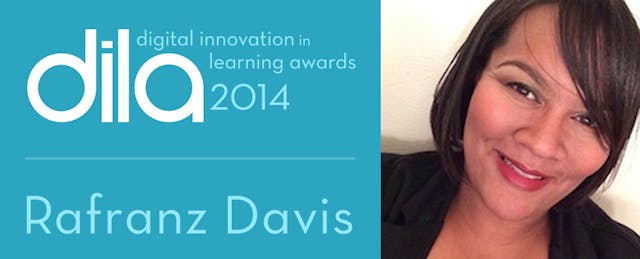As an instructional technology specialist with nine years of teaching math behind her, Rafranz Davis has experience with how technology can help in the classroom. She’s got valuable advice for educators and entrepreneurs, so when EdSurge got a chance to ask her a few questions about her experiences and perspective on the Digital Innovation in Learning Awards (co-hosted by Digital Promise and EdSurge), we jumped at the chance.
EDSURGE: What was your first experience with technology in the classroom?
DAVIS: I started out teaching a remedial math class. I was teaching kids who had had consistent years of failure, and weren’t interested in anything related to math whatsoever. At the time, we didn’t have mobile devices, but I happened to find a 10-year-old interactive whiteboard in the library, and I started using that to make lessons more interactive.
What really changed my classroom was when I found ways for students to be more creative. By adding the extra element of technology, I could give students a way to create, and to add more of themselves into what they were doing.
How do you think technology can provide students with that kind of personal investment in schoolwork?
I remember at one point, I was having students create problems and come up with videos teaching someone else their solutions. I had a student in this class who said to me, “I’m not doing it.” And I didn’t argue with him. I passed out the iPads and explained the lesson. He looked at me and said, “I might want to try it.” That was a powerful moment for me, because I knew that although he said he didn’t want to, when he saw what the kids were doing, he wanted to take part. You can’t fight that.
What made it even more amazing was that at the end, when he finished his video, he made a mistake. I said, “Well, we’ll just make this one a what-not-to-do.” And he looked and me and said, “No. I want mine to be right. I didn’t want to do this at first, and now I did it.” So he stayed late to re-do it.
This is the same kid who didn’t participate in other classes. But being able to use the technology to produce something made him want to engage. I’ll never forget that.
As an instructional technology specialist, you evaluate many edtech products. How do you think edtech companies can better address the needs of students in the classroom?
If edtech companies are not engaging in conversations with teachers and students, they’re doing it wrong. I say that because I know how my perspective has changed outside of the classroom. As a teacher, I was constantly around my students. I could engage them right then and change my lessons on the fly as needed. But when you’re not in that environment, you lose that [direct connection to student needs]. You can’t create tools for learning without connecting to the learners themselves.
That’s so important as companies start creating: Build a community with teachers. It’s not just about selling to them, it’s about catering to those needs. If you’re not doing that, there’s no point in buying whatever it is that some company is selling.
Why do you think the Digital Innovation in Learning Awards are so important?
Most awards that I’ve seen are more about how many followers you have than about the impact. The DILAs are all about the contribution. That’s what gives them a lot more credibility. They’re really about what you do and how you impact education.
The DILAs speak to what people know within their jobs, in a specific category. When you’re looking to recognize someone for what they’ve done in a position, it really needs to be about what they do in that position, and not what they write online or how many followers they have on Twitter.
How do you think nominations, in addition to direct application, changes the awards?
It means a great deal when one of your peers submits your name, writes out all the things you do, and explains why you should be considered. Especially with someone who works with you directly, that carries a lot of weight.
Are there any awards that you’re especially excited about?
I’m really looking forward to the Sharing is Caring Award for Educators. Sharing is so important in what we do.
You know, in 140 characters, you can only share so much, but when you become so involved that you sit down and actually have real conversations about why everybody is creating the way they are and what the students are doing, that’s where the real impact happens.
I also think the Listen & Learn Award is so important, because that speaks to a company that actually takes feedback from users and takes action to make what they create better.
What message do you have for those considering nominating or applying to the DILAs?
I hope people really do take it seriously and apply or nominate, because it’s a great opportunity to honor people in our communities for what they do. And that’s important!


